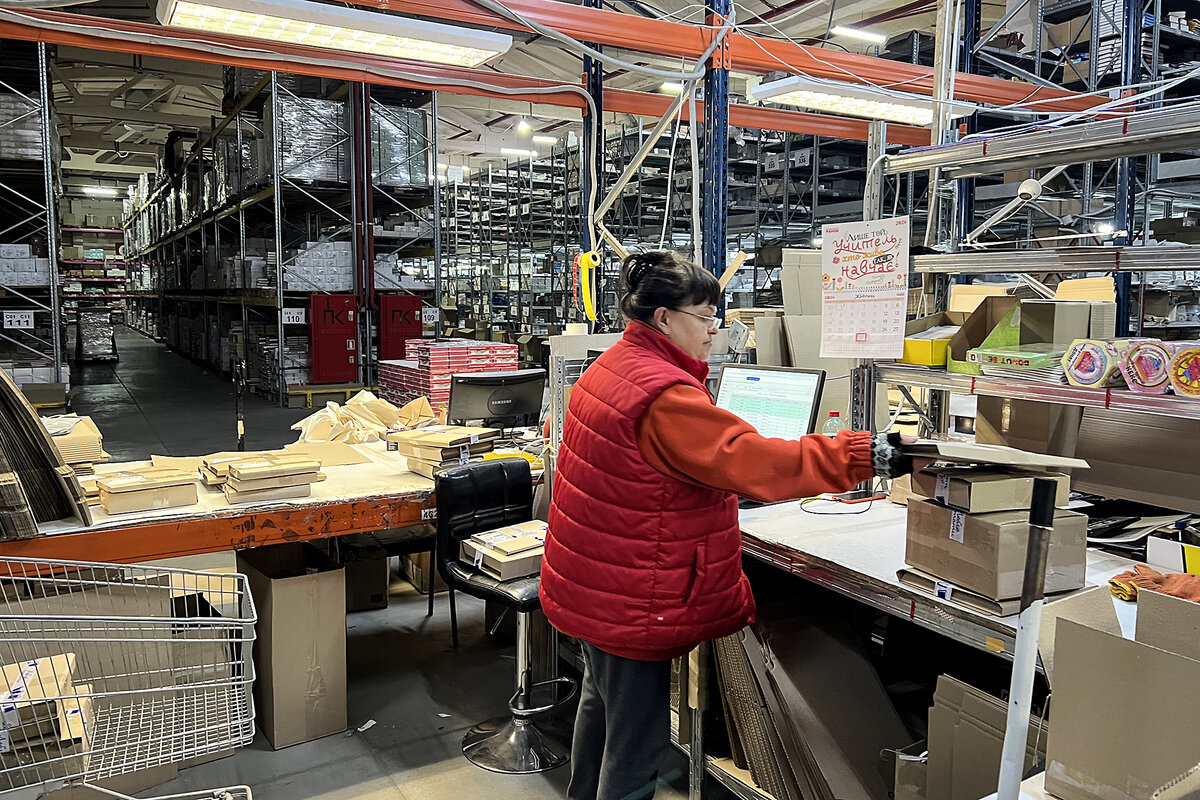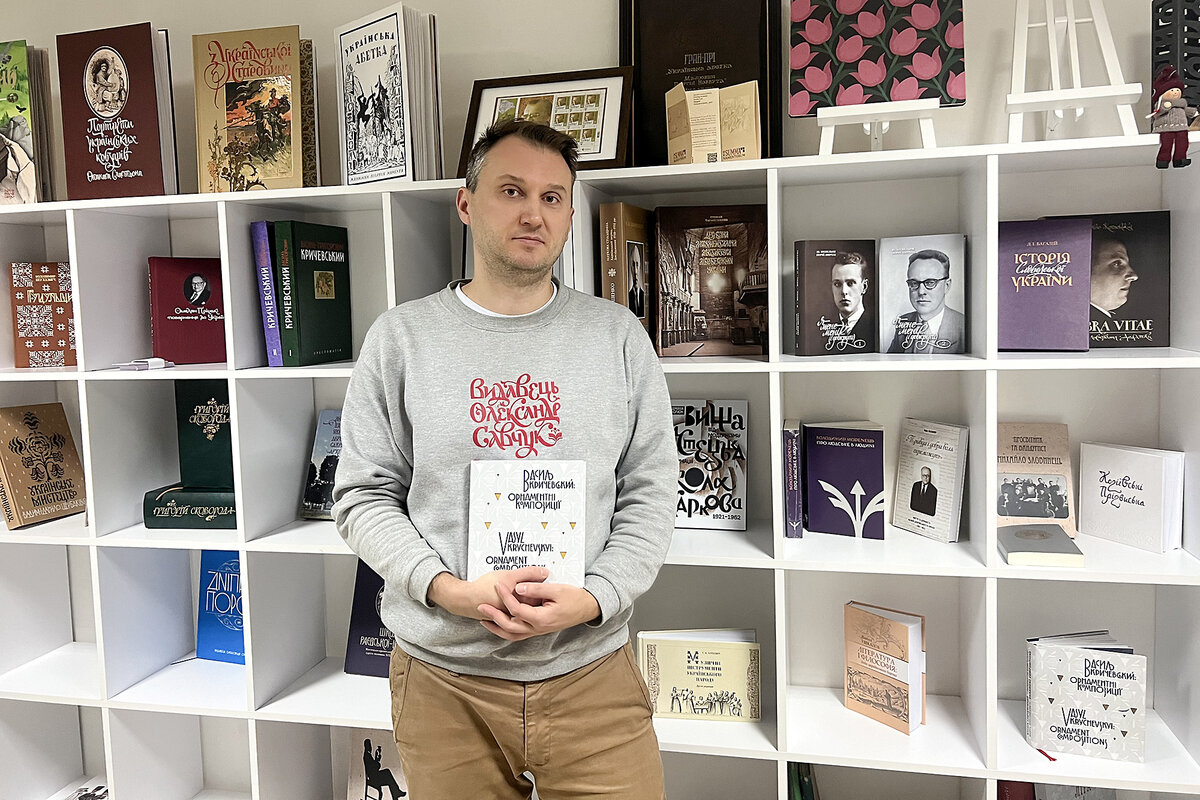War worries heavy? Internet out? In Ukraine, books are the balm.
Loading...
| Kharkiv, Ukraine
One night in November, Ihor Pohorielov was awakened by a Russian bomb blast that nearly shook him out of bed.
His thoughts went to the modern offices and cavernous storage facilities where he works as the commercial director for Kharkiv’s Ranok Publishing, and which had already been the target of Russian air strikes.
“I wondered if we had been hit again, but then I decided that pretty much any enterprise in Ukraine is a target,” he says. “I thought of the orders we need to get out and the clients we need to serve – so I came into work” the next day.
Why We Wrote This
A story focused onRussian President Vladimir Putin has made Ukraine’s book publishing industry a target of the war. But the industry and Ukrainian readers are keeping books alive as a source of Ukraine’s resilient culture, and for solace and distraction.
If Mr. Pohorielov goes into work every day despite the frequent bombings and the danger, it’s because he has books to publish.
And he is not alone in the industry. Across Ukraine, but especially in Kharkiv, the country’s publishing capital, Russia’s war has been something of a boon to the book publishing business.
As more Ukrainians seek solace and distraction in books, and as interest in Ukrainian literature and Ukrainian-language books spikes, many of the country’s publishing houses – from textbook-publishing giants to boutique operations specializing in culture – are keeping busy.
And this despite the fact that Russian President Vladimir Putin has made publishing and printing houses a key target of his war on Ukrainian culture.
Kharkiv’s publishing industry was shaken to its core last May when a Russian S-300 missile struck the giant Faktor-Druk, one of Europe’s largest printing houses. The blast destroyed presses, incinerated some 100,000 books, and knocked out the three publishing companies housed there.
Industry experts estimated gloomily that as much as 40% of Ukraine’s publishing capacity had been destroyed.
But the sense of devastation was short-lived. In a show of solidarity, several European publishers offered to print Ukrainian books for distribution to millions of Ukrainian refugees around Europe.
An American philanthropic organization, the Howard G. Buffett Foundation, quickly agreed to pick up the tab for Faktor-Druk’s reconstruction. The printing house was partially operational by September, mainly printing textbooks for the new school year. It is now working at 80% of its full capacity, company officials say.
Even as the threat of Russia’s war continues to hang over their industry, Ukraine’s publishers say a combination of their resolve to keep operating and a reawakened enthusiasm for books among a range of readers is keeping the presses running.
“Printing in Kharkiv is hanging on despite the almost daily attacks on the city, and I see how the war has our people even more determined to get the books published,” says Yuliia Orlova, general director of Vivat Publishing, a division of the Faktor Group. “And the war is reminding Ukrainians that books are an outlet for joy, for culture, for travel, when other outlets are closed to us.”
Ms. Orlova does not hide the fact that the war has been devastating for Ukrainian publishing in many ways, especially for the people who work in the sector.
“The attacks and the destruction in the city have a big impact on the mental health of our workers. People don’t sleep and they are constantly worried for their families,” she says. After nearly three years of war, she adds, many of the men who did the heavy work on the printing side of operations have been conscripted.
Since 2022, the number of registered publishers in Ukraine has plummeted from about 1,600 to 150, Ms. Orlova says. Most of those that have closed were small, specialized publishers, which did not produce large numbers of books. Overall, the number of new titles published during the first half of last year fell by only 6% from the same period in 2023.
But Ms. Orlova cites another statistic that underscores the bright side of Ukrainian book publishing: Over the same period, the total number of books printed grew by 70%.
The reasons for that jump are largely related to the war. Russia’s systematic destruction of Ukraine’s infrastructure has meant widespread power outages and spotty access to the internet, Ms. Orlova says.
“We hear all the time about people rediscovering the joys of books as they spend less time on their computers and phones,” she says.
A key driver of the return to books is escapism. “People want to distract themselves from all the sad and depressing things going on around them, so they turn to fiction and fantasy,” she notes. “It’s their way to escape.”
A big seller: romance literature. Nearly three years of full-scale warfare have been particularly hard on couples and marriages, Ukrainian psychologists say. Men are liable to conscription, and tens of thousands of them have been killed. The dislocations of war mean that opportunities for romance and relationship-building are limited.
“The difficult environment explains the biggest trend in fiction, what I call ‘fantasy romance,’” Ms. Orlova says.
Mr. Putin’s war on Ukrainian culture – targeting museums, churches, universities, and publishing houses – is feeding a renewed interest in history, language, art, and literature that confirm Ukrainian nationhood, publishers say.
“Interest among Ukrainians in who we are was already starting to grow, but it was the full-scale invasion that really encouraged this desire to know more about our history and culture,” says Oleksandr Savchuk, whose specialty Kharkiv publishing house carries his name.
“For many Ukrainians, the picture of who we are was like a puzzle with lost pieces,” he says. “But now people are finding those pieces so we can complete the full picture.”
To help nurture that process, in 2023 the philosophy professor and publisher opened a facility he calls a “Book Strongroom,” a combination bookstore, event space, and neighborhood bomb shelter adjacent to his publishing operations.
“This is a place where people can come and explore their surging interest in Ukrainian books, meet with others who have this interest – and feel safe coming here,” Dr. Savchuk says.
Among the recent publications on the facility’s shelves: a book published in London in English in 1912 on Ukrainian folk art and only recently translated; a biography of Serhii Tymoshenko, considered the father of Ukrainian architecture; and a tribute to the lost wooden churches of Ukraine, about 95% of which were destroyed in the 1920s under Soviet rule.
Oleksandr Savchuk is a small player who has published about 50 titles over the last decade. His pride in having helped reawaken his country’s interest in books and Ukrainian culture is mixed with guilt.
“For the 12 years before the invasion I was suffering to try to show people their great history and culture. It was a hard-going process,” he says. “Of course it was a tragic reason, this tectonic and shocking event, that changed things, and I’m sorry for that. But I see this return to books, I see now that I’m being heard,” he adds, “and it makes me a happy person doing this work.”








